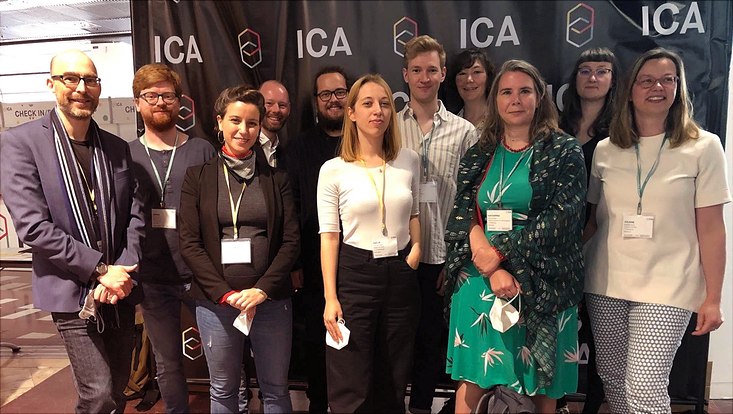Kommunikationswissenschaft
JKW bei der ICA-Konferenz in ParisBei der diesjährigen Konferenz der International Communication Association haben auch mehrere Forschende der Journalistik und Kommunikationswissenschaf ihre Ergebnisse präsentiert.
15. Juni 2022

Foto: UHH/Lischka
Bei verschiedenen Preconferences am 25. und 26. Mai 2022 begann die 72. Jahreskonferenz der ICA mit folgenden Beiträgen:
Hendrik Meyer:
"Police, Protesters, (Affective) Polarization? - Analyzing the Twittersphere of the G20 Protests in Hamburg 2017 from a Network Perspective"
(Preconference: Post-Truth and Affective Publics’ Challenges to Social Ties. Disinformation, Populism, Data-Driven Propaganda).
Laura Laugwitz:
"Basics of Computing"
(Preconference: Hackathons).
Hadas Emma Kedar:
„The Rise of the Pandemic Pundit: Comparing the construction of expertise on TV news in the early months of the COVID-19 pandemic in Germany, Israel and the USA“
(Preconference: The Science of Science Communication: Mapping the Field).
Lars Guenther & Justin Schröder (Vortrag):
"Trust in science among digitized publics: A segmentation of South Africans’ trust in science and future research prospects"
(Preconference: The Science of Science Communication: Mapping the Field).
Juliane Lischka (Vortrag), Laura Laugwitz, Nadja Schaetz, Hendrik Meyer, Lucien
Heitz und Katharina Kleinen-von Königslöw:
“When AI selects political news: Algorithmic content curation and party plurality”
(Preconference: Understanding the dynamics of (ir)responsible AI in journalism and algorithmically shaped news flows).
Laura Laugwitz:
"Affordances of News Recommendations on German News Websites"
(Preconference: PhD Colloquium Journalism Studies).
Während der Konferenz vom 27. – 29.05.2022 waren folgende Beiträge von Forschenden der JKW vertreten:
Julia Niemann-Lenz:
„Shaping TikTok as a Political Space: Influencers' Self-Perception and Their Interplay With Other Technical and Social Actors in Constructing the Public Sphere“
(Session: Communication and Technology Interactive Poster Session).
Jessica Kunert (Vortrag), Michael Brüggemann, Jannis Frech, Wiebke Loosen & Volker Lilienthal:
„What Investigative Journalism Will Not Cover: Blind Spots in Investigative Reporting”
(Session: The Many Facets of Studying News Production).
Janine Brill (Vortrag), Lars Guenther & Georg Ruhrmann:
„Felons, Criminal Organizations, Islamic Terrorists, and Right-Wing Extremists: Media Framing of Criminals in German Television Crime News”
(Session: Applying Framing as a Lens for Studying News and Journalism).
Gerret von Nordheim (Vortrag), Katharina Kleinen von Königslöw et al.:
“The Different Worlds of Google: A Comparison of Search Results on Conspiracy Theories in 12 Countries”
(Session: One World, Many Discursive Networks).
Edda Humprecht (Vortrag), Laia Castro, Sina Blassnig, Michael Brüggemann & Sven Engesser:
„Media Systems in the Digital Age: An Empirical Comparison of 30 Countries“
(Session: Comparing Media Systems and National Audiences).
Christian Strippel (Vortrag), Sünje Paasch-Colberg, Laura Laugwitz & Cornelius Puschmann:
„Bias in, Bias Out: Comparing Receptive and Content-Based Approaches of Hate Speech Classification“
(Session: Computational Methods Interactive Poster Session).
Nadja Schaetz (Vortrag), Emilija Gagrcin, Roland Toth & Martin Emmer:
„Comfortably Concerned: The Role of Algorithm Dependency and Privacy Concerns in Platformized News Consumption“
(Session: Mass Communication Interactive Poster Session).
Lars Guenther (Vortrag), Susan Joerges, Daniela Mahl & Michael Brüggemann:
„Framing Climate Change: A Systematic Review Based on 25 Years of Literature“
(Session: Framing in Focus: International, Longitudinal and Methodological Perspectives on Framing of the Climate Crisis and Beyond).
Lilith Hausherr (Vortrag), Darius Herzog & Juliane A. Lischka:
“News Start-Ups in the Corona Pandemic: Adaptive Resources and Resilience”
(Session: Media Industry Studies Interactive Poster Session).
Michael Brüggemann (Vortrag), Jannis Frech & Torsten Schäfer:
“Transformative Journalisms: How the Global Ecological Crisis Is Transforming Journalism”
(Session: Norms in Journalism Practice).
Viele der hier gesammelten Projekte stecken noch im Review-Prozess, nur der Pre-Print vom letzten Beitrag wurde bereits bei osfpreprints veröffentlicht.
